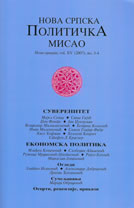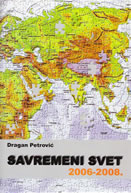| NSPM in English | |||
The Realist Prism: The Ukraine That Might Have Been |
 |
 |
 |
| уторак, 26. јануар 2010. | |
|
(World Politics Review, 22 Jan 2010)
The last time Ukrainians went to the polls to select a president, the battle between Yushchenko and Yanukovych was portrayed as an apocalyptic clash, presenting a momentous choice for Ukrainians between a bright future with the West and a return to its post-Soviet embrace of Russia. Gallons of ink have been spilled over the last six years explaining why Ukraine's subsequent attempts to consummate the promise of closer integration into the Euro-Atlantic world ultimately failed. But there hasn't been much soul-searching in Western capitals, where it has been much easier to point the finger -- at squabbling Ukrainian politicians, who were unable to unite to form an effective government that could pursue reforms, or at Russia's dark machinations to retain Ukraine within its sphere of influence (notably through the economic leverage of natural gas). The West's own complicity in Ukraine's failures is left unmentioned. Members of the realist community had already worried that American and European rhetoric on Ukraine in the aftermath of the Orange Revolution was grievously out of sync with what governments were actually prepared to do. A European Union gripped by expansion fatigue was in no mood to seriously consider Ukraine's membership bid. Admitting a country to the union that would be a net consumer of EU development funds while doing potential damage to both the sustainability of the Common Agricultural Policy and the steel industries of the EU's core countries was not on the agenda. For their part, NATO countries did not want to see a security consumer join the alliance, especially in the aftermath of the Georgia-Russia conflict of 2008. Ukraine today is no closer than it was in 2004 to entering either NATO or the EU, and the prospects for membership in the near future -- certainly during the term of the next Ukrainian president -- seem nil. Nor did Washington step up to the challenge. Members of Congress were happy to wear orange neckties when Yushchenko visited Washington in 2005. But there was no relaxation in America's own economic barriers against Ukrainian goods, nor any prospect of a free trade deal with the United States. The only concession Yushchenko brought home was permanent graduation from the Jackson-Vanik amendment, a hollow victory given that Ukraine hadn't put up barriers to Jewish emigration since independence in 1991 and had been a market economy for years. And when a number of NATO countries raised objections to Ukrainian membership, blocking a membership action plan from being proffered at the 2008 Bucharest summit, Washington decided against exploring other options, such as designating Kiev a "major non-NATO ally" (a status enjoyed by countries like Pakistan). But what might have happened if Brussels and Washington had pursued a less ambitious agenda, one that might have returned real benefits -- of the kind that could have been translated into political capital inside of Ukraine -- sooner? To answer that question, it helps to consider the policy options that might have been pursued as an alternative to turning Ukraine into a proxy political battleground between "East" and "West." Instead of holding out the prospect of rapid membership in the EU, Ukraine might have been encouraged to become a full member of the European Free Trade Association (EFTA). Given that, in the past, EFTA members have later joined the European Union, such a step would not have precluded Ukraine's eventual EU accession -- and might have helped to make EU membership more likely by bringing the Ukrainian economy closer to European standards. Within EFTA, Ukraine could have also used the association's existing joint working group with Russia to determine areas in which Ukraine could participate in the emerging free-trade bloc between Russia, Belarus and Kazakhstan -- thereby benefiting those businesses in southern and eastern Ukraine that are still closely tied to the Russian market. EFTA's existing agreements or ongoing negotiations with the South African Customs Union, the Gulf Cooperation Council and MERCOSUR provide models for how, as an EFTA-member, Ukraine would also be able to function within the Common Economic Space. As for NATO, in a country where at least half the voters opposed seeking membership, and where attempts to expand the alliance eastward caused major friction with Russia -- which unleashed the gas weapon against Kiev in retaliation -- a more realistic option should have been pursued, one that sought to make Ukrainian neutrality -- defined as a state with no foreign forces on its soil and no military commitments to other states -- more of a reality. Neutral status, which seems to enjoy the support of the majority of Ukrainians, could have been structured in such a way to permit full cooperation with military coalitions set up with U.N. Security Council approval (such as the Afghanistan mission), and with those considered necessary to secure the "security space" of "wider Europe." Under such an arrangement, Ukraine would have been free to work toward a new NATO-Ukraine charter spelling out areas of cooperation, without alienating Moscow. Making Ukraine a neutral state with a posture similar to that adopted by India -- free to cooperate with different countries yet a member of no particular bloc -- could also have created better conditions to negotiate the removal of the Russian Black Sea Fleet from Ukrainian bases after Moscow's leases expire in 2017. As it currently stands, Ukraine is no closer today than it was in 2004 to removing foreign forces deployed on its soil. Finally, a serious effort should have been undertaken to improve Ukraine's own energy industry. Western companies could have helped Ukraine's state oil and gas company Naftohaz develop the country's offshore oil and gas reserves, thereby reducing its dependence on Russia, while freeing up more Russian gas for European consumption. Instead, six years have passed with little to show for it. This realistic agenda was rejected in favor of a more grandiose vision -- one that has not come to pass. As a result, six years have been lost, and the next president of Ukraine will not find the doors of the EU or NATO opened any wider. EFTA and an "associated status" with NATO may have seemed like half a loaf to Ukrainians who believed they were promised full and complete integration into the Euro-Atlantic world. But a partial integration with the West would have been better than the current alternative. Nikolas K. Gvosdev is the former editor of the National Interest, and a frequent foreign policy commentator in both the print and broadcast media. He is currently on the faculty of the U.S.NavalWarCollege. The views expressed are his own and do not reflect those of the Navy or the U.S. government. His weekly WPR column, The Realist Prism, appears every Friday. |
Од истог аутора
- Russia’s Foreign Policy: What’s Next?
- Turning Russia into a Euro-Atlantic Stakeholder
- Engaging the Southern Democracies
- Shaping the Multipolar World
- What the United States Can Learn From the Soviet War in Afghanistan
- The Realist Prism: Horse Trading with Beijing
- Resetting Russia
- Facing the Facts on Terror
- Reagan Plagiarized
- Moving NATO Forward
Остали чланци у рубрици
- Playing With Fire in Ukraine
- Kosovo as a res extra commercium and the alchemy of colonization
- The Balkans XX years after NATO aggression: the case of the Republic of Srpska – past, present and future
- Из архиве - Remarks Before the Foreign Affairs Committee of the European Parliament
- Dysfunction in the Balkans - Can the Post-Yugoslav Settlement Survive?
- Serbia’s latest would-be savior is a modernizer, a strongman - or both
- Why the Ukraine Crisis Is the West’s Fault
- The Ghosts of World War I Circle over Ukraine
- Nato's action plan in Ukraine is right out of Dr Strangelove
- Why Yanukovych Said No to Europe

.jpg)








 As the dust settles from the first round of
As the dust settles from the first round of 













